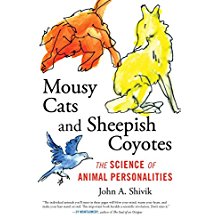Any pet ow ner can tell you that animals have personalities. Now there’s a book that takes this one step further. Mousy Cats and Sheepish Coyotes: The Science of Animal Personalities is by John Shivik, a wildlife expert in the development, testing, and application of non-lethal techniques for predator management.
ner can tell you that animals have personalities. Now there’s a book that takes this one step further. Mousy Cats and Sheepish Coyotes: The Science of Animal Personalities is by John Shivik, a wildlife expert in the development, testing, and application of non-lethal techniques for predator management.
This project traces back to when his marriage ended and he was “stuck with” his wife’s cat, a creature he initially hated. But as he came to like his new pet, he became intrigued by animal personalities. This book explores what science thinks of animals as individuals, why this matters for our human-pet relationships, and what this means for their evolution and adaptation to nature.
I learned about this book through an interview with Mr. Shivik in an email from Smithsonian magazine. Here are some excerpts —
He was drawn to study animal personalities because —
“As a scientist, the consistent variation in their behavior first frustrated my methods and P-values. Then I learned that behavioral variability wasn’t just statistical noise but was actually a key component of biology. When I realized that other scientists were beginning to delve into the science of animal personality, I was excited by that new and growing field. The research is not just about whimsical demonstrations of interesting animals, but rather a scientific investigation of the huge impact that animal personality has on ecology and evolution.”
Regarding the most surprising stories he discovered about animal personalities —
“I was most surprised by the breadth and depth of the narratives the researchers recounted. For example, it wasn’t only the existence of personality in spiders that was so amazing. It was thinking about spiders’ personalities in the context of ecology and evolution that truly flabbergasted me. Some spiders, by being more social than others, can live in places where their more solitary conspecifics can’t survive. There were stories of chickens that were selected to be the best of the best in terms of egg-producing physiology, but they self-destructed due to aggressive personalities. Long-term studies of bluebirds demonstrated that the dominant personality types within a population changed based on the age of a colonial population; some bluebirds are better invaders and others are better occupiers.”
Does he look at animals differently now?
“I’ve recently concluded that the fundamental tension in biology is an optimization problem: How does a species remain diverse and variable enough to survive, yet uniform and efficient enough to out-compete other species? Morality is a biological thing. Populations need individual variation, from passive to aggressive personalities. Evil arises when variation reaches the thin tails of the bell curve. Personalities occur that are so extreme that they are counterproductive to the species itself. Serial killers and malevolent dictators arise as rouge actors without empathy for others, in the same way that cancerous cells dominate benevolent cells—to the self-destructive demise of the entire body.
I have come to acknowledge that unique personalities can also lead to unique emotional bonds not only within a species, but between species. The variation of individuals, the relationships between individuals, and the desire for biodiversity … are what will allow humans to cooperatively flourish with the earth’s other species.”
The complete interview can be found under “Can Animals Be Ornery?” by Natalie Escobar at http://links.sicirculation.mkt6348.com/servlet/MailView?ms=MzE5OTY2ODAS1&r=ODU4MDk3OTA1NDUS1&j=MTE4MDE1OTYwMgS2&mt=1&rt=0.
